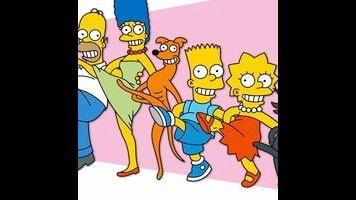The Simpsons: “The Falcon And The D’OHman”

New Simpsons episodes are so inevitable that they make Death and Taxes look like chumps. Chumps, I say. Back in the 1950s, it took a chess-loving medieval knight to make a chump of Death, but these days, Death gazes longingly at Homer Simpson, wondering if the goofy fat cartoon silly-man would be willing to wager over a short game, all the while knowing that He himself, Death, may be the personification of human fear of the great mystery that awaits each and every person who has drawn and will someday fail to draw breath, but Homer, on the other hand, has the Fox Broadcasting Company behind him, and Death cannot beat a corporation.
Which leads us back to inevitability. Older viewers may remember that The Simpsons was once a juggernaut of funny, combining razor-sharp satire with a wicked wit that seemed far too hip for mere television. Back in those ancient days, The Simpsons was a controversial show that was lambasted by the President himself and used by pundits as an example of the degradation of culture. Like any great and subversive artwork, it spilled out of its frame, placing tested and true jokes and cognoscenti-defining catchphrases into eager mouths across the nation, offering to an over-earnest public its first glimpse at the joys and the simple pleasures to be found in irony and innuendo. Those were the halcyon days, but there was darkness at work, too. Brother turned from brother over the burning issue of whether the verb “sucks” could be used to denigrate something in casual company. Sisters sometimes mauled long-lost aunts when “d’oh” would pop up in a casual game of Scrabble with or without the elusive apostrophe tile. Fathers suicide-pacted with third-cousins-twice-removed in events that might have had little to do with The Simpsons other than the cryptic words “eat my shorts” that could be found carved into a nearby tree. Clearly, The Simpsons was a show ripe for which one could reckon. With.
And reckon many did. As it passes into its 23rd season, some believe that The Simpsons remains as fresh and fragrant as the object of Troy McClure’s secret obsession. Others find it scaly and a bit stinky and gasping for breath while it flops on the ground, like some sort of animal that lives in water but has been pulled out for nefarious reasons. Either way, a new season of The Simpsons is something more miraculous than death or fishes.
Tonight’s episode, “The Falcon and the D’ohman,” uses a unique plot device that no Simpsons episode has ever employed in the past, in which Homer tries to befriend someone who does not wish to be his friend. This someone is a security guard named Wayne, who is voiced by Kiefer Sutherland. It is a well-known fact that Kiefer Sutherland would reluctantly torture his own grandmother for her secret bundt cake recipe, and so by the transitive property of television, Wayne turns out to be a torture-happy secret agent who is tortured by his torturously guilty memories of enhanced interrogation techniquing. Q.E.D. More hijinks occur, but most could be extrapolated from the information at hand. Another guest-star is Tom Colicchio, whose part lasts all of 28 seconds. He should talk to his agent about this. Thomas Pynchon has had more lines on the show, Jerry, and no one has seen his face since 1952.
The real question is whether The Simpsons can still bring the funny. All signs point to yes with big neon asterisks attached. This episode features a couple of quite funny sight gags, like the fresco on Moe’s ceiling and the delightful Taiwanese dramatization of certain events. It also features some half-assed gags that will make little or no sense to anyone under 30, such as the title itself and Homer’s singalong with The Police’s “Walking On The Moon.” That one is hard to parse. It is possible that Sting is invoking his mystical tantric control over James L. Brooks. The rest of the jokes and references clang away without being too funny or too insulting, and that is probably the best that any viewers can ask of The Simpsons in its advanced age. Thus the neon asterisks. The Simpsons is good for being as old as it is, but it is neither as funny nor as spry as it was back in the controversial days. It remains the show that toppled Death into sallow chumphood. The problem with longevity, though, is filling the remainder of its days with entertainments worthwhile of the show that once gave the nation the immortal phrase “Ay, carumba.”